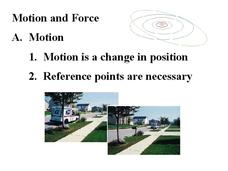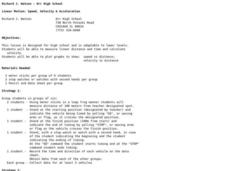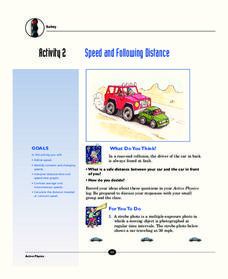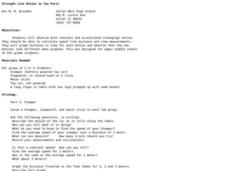Curated OER
Motion and Force
All the main concepts in motion and force are covered in this presentation. Each slide is a great summary and will appeal to your students with a clean design and images that should seem relevant. Definitions of speed,...
Curated OER
Motion and Force
Motion and force vocabulary words are concisely defined in this 13-slide PowerPoint. This is a great slideshow to review prior to a quiz for 5th or 6th grade science. Tip: Send this PowerPoint to your students so they can review it...
Curated OER
What is Motion?
Prior to beginning a math or physical science lesson on motion, use this presentation to define the concepts of motion, rate, velocity, and speed. This resource lacks concrete examples but could be useful as discussion starter.
Curated OER
Motion: Speed, Velocity, Acceleration and Networking
Learners interpret a variety of motion graphs. In this physics instructional activity, students calculate the speed and acceleration of objects using numerical data from graphs. They apply what they have learned to solve real world...
University of Colorado
Distance = Rate x Time
Every year, the moon moves 3.8 cm farther from Earth. In the 11th part of 22, classes use the distance formula. They determine the distance to the moon based upon given data and then graph Galileo spacecraft data to determine its movement.
Curated OER
Motion Problems
In this motion worksheet, students complete motion word problems where they explain and define issues having to do with motion. Students complete 32 problems.
Kuta Software
Distance - Rate - Time Word Problems
In this word problem activity, algebra learners solve 10 distance problems. Problems include motion in different directions, the same direction, and round trips.
Curated OER
Tracking Speed
Learners calculate the speed of an object, by measuring the amount of time it takes to cover a given distance, and then divide: speed=distance/time. However, the object may not have been moving at a constant rate over the given distance....
Mathed Up!
Distance Time Graphs
If only there was a graph to show the distance traveled over a period of time. Given distance-time graphs, pupils read them to determine the answers to questions. Using the distance and time on a straight line, scholars calculate the...
Curated OER
Motion Basics
Quiz those kids to assess what they've gleaned from your last lesson on Newton's laws of motion. There are 10 questions that have learners define force, acceleration, velocity, and speed. A bonus question has them write a motion story...
Curated OER
Speed
Fifth and sixth graders practice working in pairs to determine whether they can walk with constant speed. They test themselves, collect their data, draw graphs with their data collected, manipulate the data, and then draw conclusions...
Curated OER
Worksheet 3: Graphing Speed and Time
In this graphing speed and time worksheet, students answer 7 questions regarding graphing, speed, distance, derivatives, Newton's method and wheel radius.
Curated OER
Linear Motion: Speed, Velocity & Acceleration
High schoolers explore the concept of linear motion. In this linear motion lesson plan, students calculate distance and time in order to calculate average speed and velocity in the provided problems.
Columbus City Schools
Speed Racers
Who wants to go fast? The answer? Your sixth-grade science superstars! The complete resource offers the ultimate, all-inclusive playbook for mastering the important concepts of speed versus time; distance versus time; and how...
Kenan Fellows
Analyzing Speed from Different Modalities
Show us your moves. Using sensor equipment, scholars track the motion of different movements, such as jogging, skipping, or jump roping. They analyze velocity and acceleration and create graphs representing each movement.
Bowels Physics
Methods of Motion
How could you earn a $6,000,000 speeding ticket? This presentation uses an analogy that relates speed in the universe to the cost of a speeding ticket. Scholars ultimately understand that motion is relative. Also covered is the...
Curated OER
Worksheet 2: Graphs, Functions and Derivatives
In this math worksheet, students answer 7 questions having to do with graphing derivatives of functions, rectilinear motion, speed and distance.
Curated OER
Dance Challenge: Calculate and Compare Speed by Measuring a Series of Dance Movements
Really neat! Kids choreograph a dance phrase and then measure the distance and speed of the phrase using a timer and a meter stick. They collect the data on a table which they use to determine an average. A series of observation and...
InqueryPhysics
Interpreting Motion Graphs
Every movement in the world can be measured and even motionless objects can be significant indicators of movement. Focus on motion graphs that feature distance vs. time, speed vs. time, and positive and negative acceleration.
It's About Time
Speed and Following Distance
How much distance should you keep between your car and the one in front of you? Did you think of an answer in terms of time when the question clearly stated distance? The lesson covers the relationship between distance, time, and speed....
Curated OER
Forces and Motion
Fourth graders study straight line motion and the forces that affect motion, including the terms force, gravity, and speed. They determine that gravity, weight, and other forces have an effect on speed and motion.
Curated OER
Straight Line Motion in Two Parts
Students describe and quantify the motion of toy cars. In this motion instructional activity, students observe a battery powered toy car on a flat surface and a standard toy car on a sloped surface. They write their observations, measure...
Curated OER
Newton's Second Law of Motion with Simple Machines
First graders study Newton's Second Law of Motion before demonstrating the concept with a simple machine. They sing a song about speed, force, mass, and acceleration. They use simple machines to demonstrate how objects that have a higher...
Curated OER
Uniform Motion
Pupils identify when uniform motion occurs. They watch a teacher made PowerPoint explaining the concept of uniform motion and carry out an experiment to understand the concept.

























